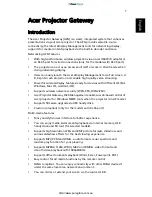
105U-G Wireless Gateway
User Manual
Page
21
©
August 2003
For example, to monitor the comms status of I/O register 1045, perform a binary/discrete
read on register 6045 (the status register for 1045). A value of “1” will be returned if this I/O
point is in comms fail, and a “0” returned if the status is normal.
If it is desired to monitor the comms status of all I/O points, it is more efficient to only
monitor the comms status of one I/O point at each remote module (if this point is in comms
fail, then all points at the remote module will be in comms fail). If this point is an input, then
the comms fail time for this input can be made short, to give an early warning of a comms
problem (this means that the corresponding update time for the input at the 105U will need to
be short). If the point is an output, then the update time for the output should be made short.
2.7
Security Considerations
There are three dimensions of security considerations:
1.
Failure to operate when required - or “operational reliability”.
The features discussed above optimise operating reliability. Using an acknowledgement
and re-try protocol ensures that the transmitting module is aware whether the transmitted
message has been transmitted reliably. The “comms fail” alarms provide indication if the
radio link has failed to operate.
2.
Mal-operation, or operating when not requested.
This problem occurs when an output is “triggered” by the wrong radio device. The 105G
modules use frequency encoding and a very secure addressing system to ensure this does
not occur. An additional security level using data encryption can also be selected.
3.
Malicious operation, or “hacking”
This is the problem most associated with security concerns - the ability for someone to
access information from a radio system by “listening-in”, or to cause damage by
transmitting radio messages to force outputs.
A security option can be selected during the module configuration to protect against this.
The security option (if selected) adds data encryption to radio messages. Modules in the
same system are automatically configured with the encryption key, such that only these
modules can understand each other. “Foreign” modules will hear the messages, but
cannot decrypt the messages. For more information, refer to section 4.2.2.
















































